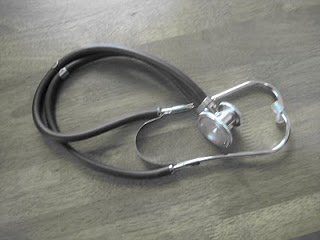“A hospital is no place to be sick.” ~ Samuel Goldwyn
Anyone who has spent any amount of time in a hospital is aware of how difficult it is to be in one. Between being sick, emotional stress, lack of sleep, a million people in and out of your room, overworked nurses, fresh right out of medical school residents, etc., it can be nothing short of a nightmare. I have had the distinct pleasure of being hospitalized four times in the past year and a half and I think I have learned a few things along the way that may be worthy of passing on. Hopefully you will never need to know them but just in case, here we go:
1. Always carry a list of your medications on you either in your purse or your wallet. This is especially important if you take multiple medications. I know, you are going to sit back and say “well I only take one or two, I know them by heart.” Trust me, when they are hooking you up to all kind of machines and sticking needles in you left and right; it is hard enough to even remember who you are, never mind your medications.
2. Ask your nurse to tell you every medication she gives you and what the dosage is. Everyone makes mistakes and I have to tell you, I have caught some whopper mistakes. Personally, I think the hospitals with the best nurses will bring the medications to you still in the package and open them in front of you while telling you what each one is.
3. Make sure the doctor in charge of your care orders ALL of your medications, not just the prescription ones. This may mean you have to bring/use your own stash. Sometimes pharmacies may not carry a certain prescription medication and forget about getting something non-prescription most of the time. I was in a situation where a doctor said I would be OK not taking a prescription eye drop for a few days that the hospital did not carry. I am sure my eye doctor would have thought differently. So what did I do? I had the eye drops in my purse. I told the nurse I was using them (this is VERY important) and I used them. No need to make one medical problem worse while you are trying to fix another, right?
4. Write everything down if you are able to. If you are too sick, ask your doctor/nurse to write down anything important they just told you. You are much too stressed, too sick, and too exhausted to be expected to remember anything that is told to you.
5. You will not sleep in the hospital unless you are doped up on so many drugs that you have no choice. For the average person though, this is not the case. Ask for sleeping medication to be ordered for you. Sleeping medication is usually ordered on an as needed basis, so you get to decide if you need it later or not. The best time to ask for this is when the doctor comes in to do your initial evaluation when you are admitted. If your forget, ask your nurse as soon as you remember. It is a lot easier to get a doctor’s order while they are around rather than at 2am when you just want to cry because you are exhausted and can’t sleep.
6. Speaking of sleep, try to get it when you can. This may mean shutting off your phone, asking visitors not to come, etc. Anyone who knows anything about good sleep hygiene will tell you don’t nap during the day as you won’t sleep at night. I say to hell with that, this is the hospital. People are going to wake you up at 4am to take your blood pressure even though it has been normal your entire life and you are sleeping for the first time in two days. Nap when you can, even if it is 4pm. You will be grateful later that you did.
7. If you are not a frequent flyer to the hospital or something really critical is going on, try to have someone with you during the day and not just anyone. Don’t automatically think the person closest to you in your everyday life is the best choice. Try to pick someone who can handle you at your worse, can stay calm when it all hits the fan, and will advocate for you. The last thing you need is someone hovering over you every minute saying “oh my god, oh my god.” Have them take the notes if necessary and be direct with them about when you need to rest, sleep, or need them to smuggle in a stiff drink (OK, just kidding on that one).
8. Make nice with your nurse. He/she is your biggest ally (besides yourself) and your best chance for getting through the whole experience. If you can summon up the energy, try to establish a rapport with your nurse. Also, ask them if they can try to be your nurse the next time they are working (if you can stand them). A lot of hospitals try to do this but it can oftentimes get overlooked. There is something to be said for a nurse who already knows you and it allows for better continuity of care.
9. Know who is who and if you don’t, ask them. They should also be checking your bracelet (that is why you have one!) and/or asking your name before they do anything to you such as give medications, draw blood, bring you for tests, etc.
10. This is the most important. When you know you are right or something does not feel right, speak up. And keep speaking up until the issue is resolved. There is a hierarchy in hospitals and it depends on whether it is a teaching hospital or not as to what the hierarchy is; but there is one. If it is a nursing care issue, start with your nurse and work up from there; everyone has a boss. In terms of the medical plan, speak with the doctor in charge of your care and if you are not getting the care or answers you need, ask to speak with their boss (usually a more senior resident or an attending physician).
I was once admitted from an emergency room. My pulmonologist (doctor who specializes in respiratory issues) made it clear to me what the plan would be overnight but the resident working on the floor did not follow the plan and this included breathing treatments and an increase in a medication. I was still having some difficulty breathing. I spoke with my nurse four times during the night who in turn called the doctor. He did not change anything and was too busy to come talk to me. By 6am, I told the nurse I was calling a family member to come pick me up ASAP (and I was serious-I would go to another hospital if I had to). Boy, did that doctor come to see me fast! I got a lecture about leaving a hospital AMA (against medical advice). I gave him a lecture about medical negligence. My pulmonologist was called at 6:30am on a Saturday. He agreed with me that the medical plan was not implemented. By this point, I had lost all trust in the people taking care of me and strongly felt that even if the plan was implemented now, that it was not a safe place for me to be. He agreed to discharge me with the medical plan we had initially discussed. The understanding was I would get back to the hospital if I needed to and I would stay with a family member. The pulmonologist agreed to see me in his office first thing Monday morning. Ultimately, I ended up making it through the weekend staying with family because I was implementing the medical plan my pulmonologist and I had put in place.
Now, I am not advocating to threaten to leave the hospital anytime you think something is not going right. This was a pretty unusual situation. Hospitals are very chaotic though; information does not get communicated and mistakes are made. However I think it goes to show that as a patient, you are the one ultimately responsible for your body and your medical care so listen, observe and most importantly, speak up!
Share



Leave a Reply